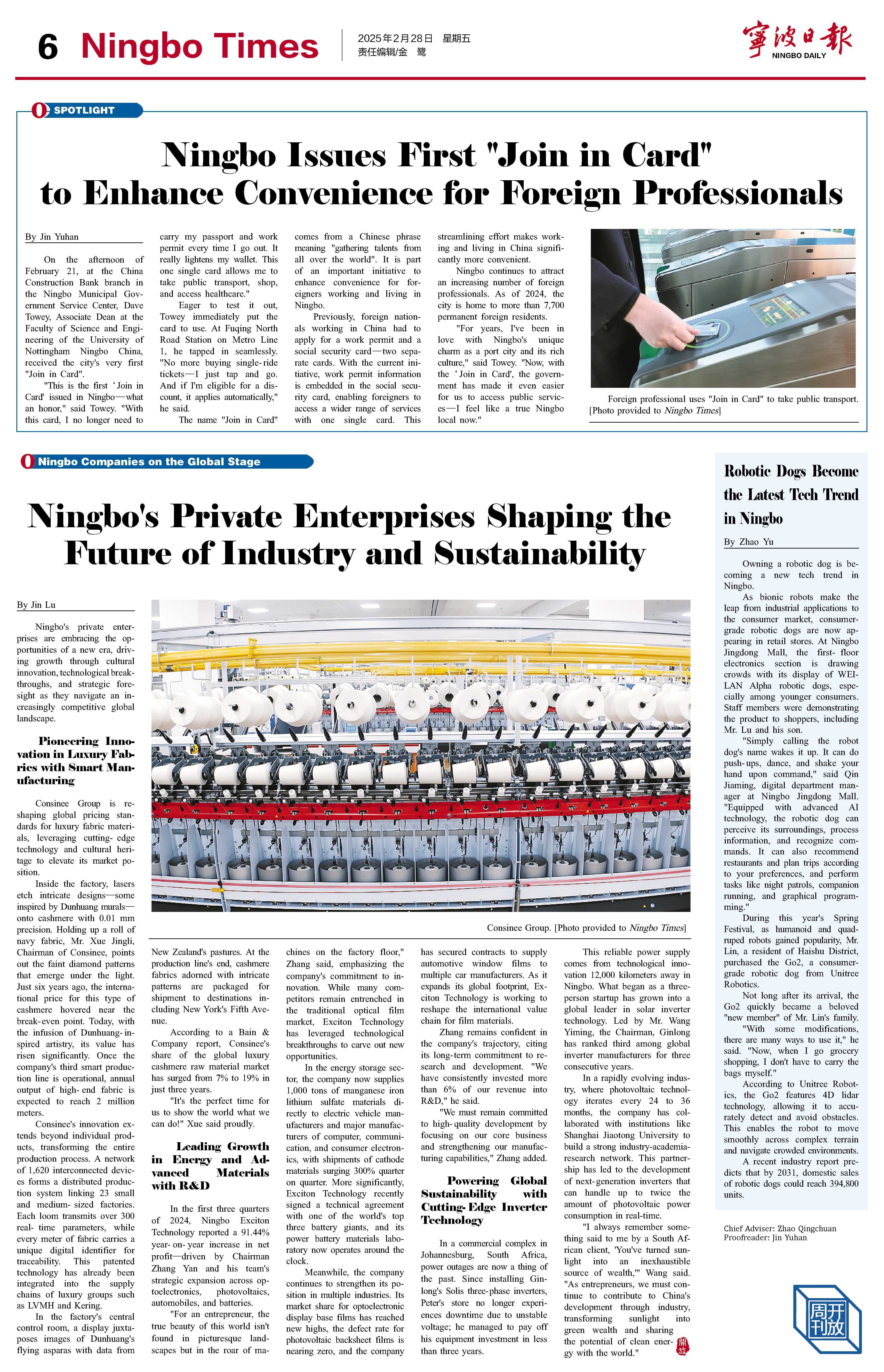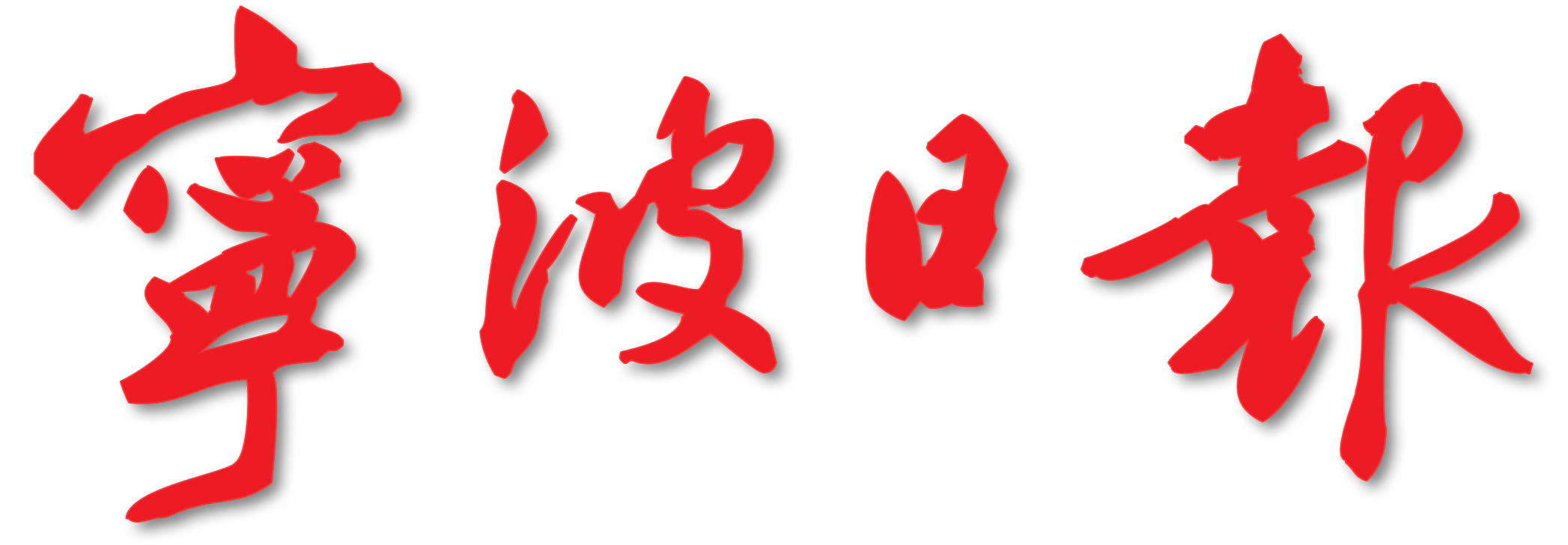By Jin Lu
Ningbo's private enterprises are embracing the opportunities of a new era, driving growth through cultural innovation, technological breakthroughs, and strategic foresight as they navigate an increasingly competitive global landscape.
Pioneering Innovation in Luxury Fabrics with Smart Manufacturing
Consinee Group is reshaping global pricing standards for luxury fabric materials, leveraging cutting-edge technology and cultural heritage to elevate its market position.
Inside the factory, lasers etch intricate designs—some inspired by Dunhuang murals—onto cashmere with 0.01 mm precision. Holding up a roll of navy fabric, Mr. Xue Jingli, Chairman of Consinee, points out the faint diamond patterns that emerge under the light. Just six years ago, the international price for this type of cashmere hovered near the break-even point. Today, with the infusion of Dunhuang-inspired artistry, its value has risen significantly. Once the company's third smart production line is operational, annual output of high-end fabric is expected to reach 2 million meters.
Consinee's innovation extends beyond individual products, transforming the entire production process. A network of 1,620 interconnected devices forms a distributed production system linking 23 small and medium-sized factories. Each loom transmits over 300 real-time parameters, while every meter of fabric carries a unique digital identifier for traceability. This patented technology has already been integrated into the supply chains of luxury groups such as LVMH and Kering.
In the factory's central control room, a display juxtaposes images of Dunhuang's flying asparas with data from New Zealand's pastures. At the production line's end, cashmere fabrics adorned with intricate patterns are packaged for shipment to destinations including New York's Fifth Avenue.
According to a Bain & Company report, Consinee's share of the global luxury cashmere raw material market has surged from 7% to 19% in just three years.
"It's the perfect time for us to show the world what we can do!" Xue said proudly.
Leading Growth in Energy and Advanced Materials with R&D
In the first three quarters of 2024, Ningbo Exciton Technology reported a 91.44% year-on-year increase in net profit—driven by Chairman Zhang Yan and his team's strategic expansion across optoelectronics, photovoltaics, automobiles, and batteries.
"For an entrepreneur, the true beauty of this world isn't found in picturesque landscapes but in the roar of machines on the factory floor," Zhang said, emphasizing the company's commitment to innovation. While many competitors remain entrenched in the traditional optical film market, Exciton Technology has leveraged technological breakthroughs to carve out new opportunities.
In the energy storage sector, the company now supplies 1,000 tons of manganese iron lithium sulfate materials directly to electric vehicle manufacturers and major manufacturers of computer, communication, and consumer electronics, with shipments of cathode materials surging 300% quarter on quarter. More significantly, Exciton Technology recently signed a technical agreement with one of the world's top three battery giants, and its power battery materials laboratory now operates around the clock.
Meanwhile, the company continues to strengthen its position in multiple industries. Its market share for optoelectronic display base films has reached new highs, the defect rate for photovoltaic backsheet films is nearing zero, and the company has secured contracts to supply automotive window films to multiple car manufacturers. As it expands its global footprint, Exciton Technology is working to reshape the international value chain for film materials.
Zhang remains confident in the company's trajectory, citing its long-term commitment to research and development. "We have consistently invested more than 6% of our revenue into R&D," he said.
"We must remain committed to high-quality development by focusing on our core business and strengthening our manufacturing capabilities," Zhang added.
Powering Global Sustainability with Cutting-Edge Inverter Technology
In a commercial complex in Johannesburg, South Africa, power outages are now a thing of the past. Since installing Ginlong's Solis three-phase inverters, Peter's store no longer experiences downtime due to unstable voltage; he managed to pay off his equipment investment in less than three years.
This reliable power supply comes from technological innovation 12,000 kilometers away in Ningbo. What began as a three-person startup has grown into a global leader in solar inverter technology. Led by Mr. Wang Yiming, the Chairman, Ginlong has ranked third among global inverter manufacturers for three consecutive years.
In a rapidly evolving industry, where photovoltaic technology iterates every 24 to 36 months, the company has collaborated with institutions like Shanghai Jiaotong University to build a strong industry-academia-research network. This partnership has led to the development of next-generation inverters that can handle up to twice the amount of photovoltaic power consumption in real-time.
"I always remember something said to me by a South African client, 'You've turned sunlight into an inexhaustible source of wealth,'" Wang said. "As entrepreneurs, we must continue to contribute to China's development through industry, transforming sunlight into green wealth and sharing the potential of clean energy with the world."



